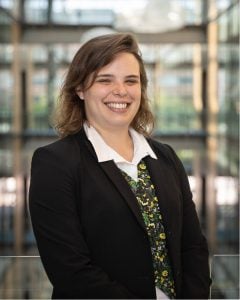This article is part of a series featuring Q&As with Ralph O’Connor Sustainable Energy Institute (ROSEI)-affiliated researchers. Next up is Grace Panetti, an assistant professor in the Krieger School of Arts and Science’s Department of Chemistry and a ROSEI core faculty member. She joined Hopkins on July 1 from Princeton University, where she recently completed her postdoctoral fellowship.

Grace Panetti
How did you first get involved with or learn about sustainability?
My parents are big outdoors people, and they drilled it into me that people are meant to be stewards of our environment. So, I learned about global warming from my parents at a young age. Roughly 20 years ago, it was debated if climate change was real, but it was made clear to me early in my life that it was happening.
The type of science that I first got involved in was inorganic chemistry, and sustainability and working with the U.S. Department of Energy is a big focus in that world. As a result, people around me were trying to find solutions for problems like using methane for applications besides burning. How can we turn carbon dioxide into something useful, so we’ll be encouraged to capture it more? How can we use oxygen to help make molecules that otherwise would require a lot of energy? I think that way of thinking started to rub off on me.
Why are you passionate about sustainability/renewable energy?
I see people as stewards of our environment. It’s not only my prerogative but also my responsibility to do what I can to make our communities livable and to provide an environment for other living organisms. We don’t really know what will happen if we exceed certain levels of carbon dioxide, destroy habitats, or take minerals out of the Earth, other than that it will be terrible. So, being able to recycle better, or use more abundant materials drives me when I think about new exciting chemistry.
How does your commitment to sustainability play out in your everyday life?
My wife is a wetlands scientist, and I have participated in some of her studies. I have gone out in swamps in 90-degree heat wearing huge waders while collecting data about water and soil and trying to think about how climate change has an impact on these areas.
We plan to get an electric vehicle one day but are going to stick with our old car for now because buying something new does have a negative impact on the environment. As a couple, we are very much invested in the future of our world, and our local environment very much is included in that.
In addition, I try to avoid traveling by air. Limiting your air miles is so important, so I am an avid supporter of Amtrak.
I also ride my bicycle when I can. Having just moved to Baltimore, I am trying to get used to the hills here. I moved to the Woodberry area of Baltimore, so biking to the Homewood campus is challenging! I may get an electric bike to make it easier or start to take advantage of the shuttle service offered by Hopkins. That way, if I do have to drive to campus, my mileage isn’t just my mileage but shared by other people.
Tell us about your research, and what aspects currently or in the future tie into sustainable energy efforts?
My research focuses on new ways that we can use light and use it more efficiently. In both aspects, we are thinking about the renewable energy source as the driver of chemical transformations. In some of these chemical reactions, we will be targeting carbon dioxide, which is a very abundant waste product. Anything that we can do to store carbon dioxide in materials is very valuable for our ability to fight climate change.
It is worth noting that there are critics of carbon capture technologies and I understand that criticism as it relates to limiting our production of carbon dioxide. Carbon capture doesn’t solve our emissions problem, but we need to consider it more seriously. We must not only reduce our carbon dioxide production but also aim for negative emissions to put ourselves on the right track in combating climate change.
Is there an article, book or podcast that people can check out to help better understand the area you work in or your specific work?
My field of chemistry is a little niche, so there aren’t a lot of mediums to choose from. An older book that I like is Photochemistry and Photophysics of Metal Complexes by DM Roundhill. You can learn a lot about how metal complexes absorb light and can transform that light energy into chemical energy.
If you are more interested in spectroscopy, a friend of mine puts on a podcast called the Goeppert Mayer Gauge Podcast. It’s about the various applications of photochemistry and its methods.
What advice or suggestions do you have for students who want to pursue careers in sustainable energy?
My main advice for students is do not be afraid to be creative. The sustainability field is growing because people are realizing what a big problem climate change is, so there should be a lot of jobs and money in this area. Don’t box yourself in to what you have already done or are seeing people do. Come up with something really cool and shoot for the moon.
Why did you choose to join the Hopkins sustainable energy community?
I have been involved in centers in the past and having been recruited to Hopkins through ROSEI was a plus. It was appealing to be inducted into an already established group of people who approach climate change from a variety of perspectives, not just chemistry. I have been jointly advised in both my PhD and postdoc, so, being involved with a group like that stood out. I’m so excited to be here.
